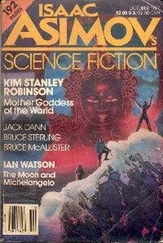“Dear me,” Sax said. He went out for a walk. Up the alleyways above Paradeplatz a row of red roses was in bloom, and he stopped to inspect the perfect petals of one young rose, nose a centimeter from it. Such velvet dark reds, there against a stucco wall. Okay, he said, here I am. I wonder what makes that red.
Cosmology and particle physics had become a single science before Sax was born, and in all the time since the hope of both sides was for the grand unified theory which would reconcile quantum mechanics and gravity, and even time itself. And yet his whole life physics had been getting more and more complicated, with postulated microdimensions taken as fact, and symmetries of fairly simple but scarily small strings invoked as explanations even though they were many magnitudes of size smaller than could ever be observed—the unobservability was itself mathematically provable. Thus the search for a final unifying theory was, as Lindley noted, a kind of religious quest; or the messianic movement in the religion that the scientific worldview had become. Then he met Bao Shuyo.
Over a winter in Da Vinci Bao took him through the latest in superstring theory, step by step. The idea of extra microdimensions was straightforward. There were seven extra dimensions but all very small, and arranged in a thing called the “seven sphere.” Then to describe a point in our conventional four dimensions one had to add coordinates in all of the extra seven dimensions, and various combinations determined what kind of particle it was, muon, top quark, etc. But these points are just the ends of strings, and the basic quantummechanical unit is a vibration in the whole string. Trying to do calculations of these produced many faster-than-light problems unless twenty-six dimensions were invoked, and so they were. But that stage of the theory yielded only bosons and not fermions. A derivative of the twenty-six-dimensional string was invoked which existed in ten dimensions, the other sixteen having become properties of the string itself, and part of the geometry of supersymmetry. But the sixteen string dimensions could be combined in a huge variety of ways, all equally possible, none preferred. Then mathematical considerations had shown that of all the possibilities, only two of them, SO(32) and E 8XE 8, exhibited handedness rather than mirror symmetry. And the universe is right-handed. That only two possibilities remained out of the myriad possibilities was startling. But there matters rested, until this winter, when Bao had shown that E 8×E 8was the preferred formulation, and that if you pursued the implications and advanced this formulation, you had quantum mechanics, gravity, and time all explained in a single theory, complex but clear, and powerful throughout.
“So beautiful it must be true,” Bao concluded.
Sax nodded. “But that beauty is its only proof.”
“What do you mean?”
“It is otherwise unconfirmable by experiment. It is the beauty of the mathematics that confirms it.”
“As well as matching all physical observations we can make! That’s more than just math, Sax. That’s everything we’ve ever seen, all conformable to this single theory!”
“True.” He nodded uneasily. It was a good point. And yet. . . . “I think it needs to predict something we have not yet seen, that happens because it and not any other explanation is the right one.”
She shook her head, dismayed by his stubbornness.
“Otherwise it’s just a myth,” he said.
“The Planck realm will never be observable,” she said.
“Well. A very beautiful myth. And valuable, believe me I am quite convinced of that. Perhaps we now say we have reached the end of what physics can explain. And so . . .”
“And so?”
“What next?”
Imbibition is the tendency of granular rock to imbibe a fluid under the force of capillary attraction, in the absence of any pressure. Sax became convinced that this was a quality of mind as well. He would say of someone, “She has great imbibition” and people would say, “Ambition?” and he would reply, “No, imbibition.” “Inhibition?” “No, imbibition.” And because of his stroke people would assume he was just having speech trouble again.
Long walks around Odessa at the end of the day. Aimless, without destination, except perhaps for an evening rendezvous with Maya, down on the corniche. Sauntering through the streets and alleyways. Sax liked Thoreau’s explanation for the word saunter: from à la Saint Terre , describing pilgrims on their way to the Holy Land. There goes a Saint Terrer , a saunterer, a Holy Lander. But it was a false etymology, apparently spread from a book called Country Words , by S. and E. Ray, 1691. Although since the origins of the word were obscure, it might in fact be the true story.
Sax would have liked to be sure about that, one way or the other. It made the word itself a problem to mull over. But as he sauntered Odessa thinking about it, he did not see how the matter could be investigated any further, the etymologists having been thorough. The past was resistant to research.
Automorphism; idiomorphism. These were qualities Sax found underconsidered in Michel’s personality theories. He said to Michel, “We make ourselves.”
Altruistic behavior will tend to be chosen when k > 1/ r , where k is the ratio of recipient benefit to altruist’s cost, and r is the coefficient of relationship between altruist and recipient, summed for all recipients. In the classical version of the theory r is the proportion of genes in two individuals that are identical because of common descent. But what if common descent is taken to mean the same phylum or order? What if r is not a function of common descent but of common interest? Sax found the social sciences very interesting.
For a time after he had mostly recovered from his stroke, Sax read quite a lot about strokes and brain damage, trying to learn more about what had happened to him. One case, famous in the literature, concerned a brilliant student at the polytechnic in Moscow, wounded in the head during World War Two. This young Russian, Zasetsky by name, had suffered gross trauma to the left parietal-occipital area (like Sax), and could no longer perceive his right visual field, could not add, knew not the order of the seasons, and so on; his symbolic and conceptual faculties had been crippled. But his frontal lobes had remained intact (as had Sax’s), leaving him his will, his desires, his sensitivity to experience. And so he had spent the rest of his days struggling to write down an account of his mentation, for the benefit of science, also for something to do; it was his life project, at first titled “The Story of a Terrible Injury,” later changed to “I’ll Fight On.” He wrote every day for twenty-five years.
Sax read this journal with immense feeling for Zasetsky, the sentences sometimes causing a terrible stab to the heart, the perceptions in them were so familiar: “I’m in a kind of fog all the time, like a heavy half-sleep. . . . Whatever I do remember is scattered, broken down into disconnected bits and pieces. That is why I react so abnormally to every word and idea, every attempt to understand the meaning of words. . . . I was killed March 2, 1943, but because of some vital power of my organism, I miraculously remained alive.”
That hand on his wrist, how to tell it!
As Ann and Sax were being blown around in the storm, Sax felt an updraft in the thunderhead drawing them up and concluded they had escaped drowning at sea only to be thrown right up out of the sky. The cockpit dome would probably hold even against the vacuum of space, but the cold would kill them. It was too loud to remember anything, but he wanted to remember to say to Ann, We ask Why all our lives and never get past Because. We stop after that word, in disarray. I wish I had spent more time with you.
Читать дальше
Конец ознакомительного отрывка
Купить книгу












